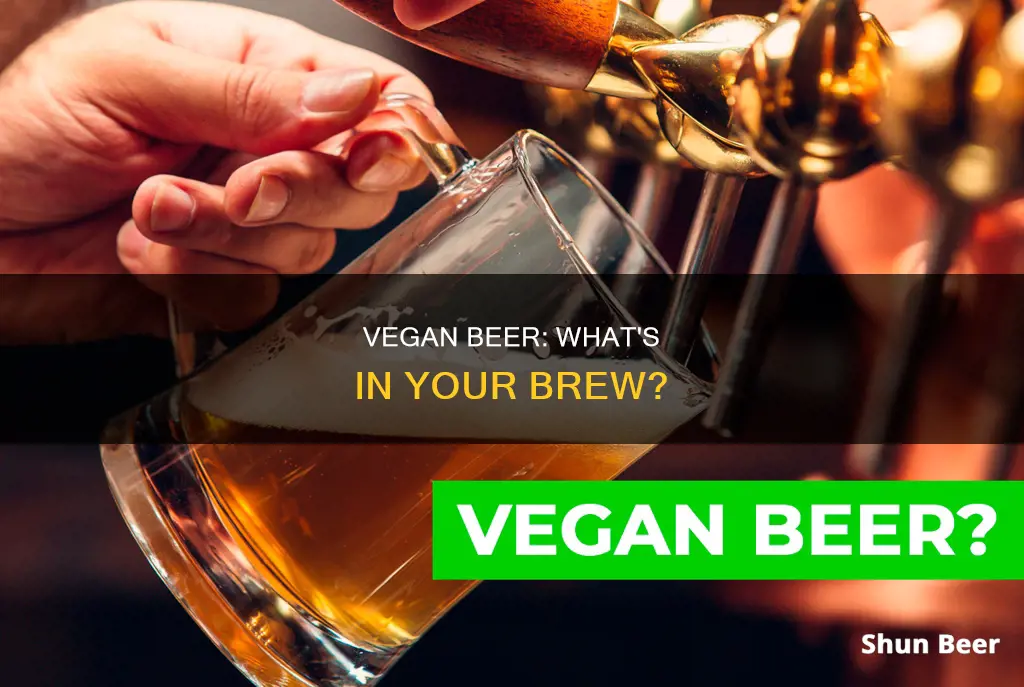
Beer is typically made from barley malt, water, hops and yeast, which are vegan ingredients. However, some brewers add finings, or clarifying agents, that are derived from animal products, such as isinglass (from fish bladders), gelatine (from animal bones and skin), glycerine (from animal or vegetable fats) and casein (from milk). These ingredients are added to remove impurities and give the beer a clear, bright appearance. While these ingredients are eventually filtered out, some particles may remain, making the beer unsuitable for vegans. It can be challenging to identify vegan beers, as manufacturers are not required to list ingredients on beer labels. However, resources like Barnivore provide lists of vegan-friendly alcoholic drinks, and some beers may display vegan symbols on their packaging.
| Characteristics | Values |
|---|---|
| Basic ingredients | Water, yeast, hops, and barley |
| Fining agents | Isinglass, gelatin, glycerin, casein, egg whites, lactose, honey |
| Vegan beers | Budweiser, Bud Light, Coors, Coors Light, Carlsberg, Boddingtons, Guinness, Sierra Nevada Pale Ale, Harpoon IPA, Torpedo IPA, Goose Island, Speedway Stout, Ice Draft Light, Yuengling, Michelob Light |
What You'll Learn

Common non-vegan beer ingredients
Beer is usually made from barley malt, water, hops, and yeast, so it is often vegan-friendly. However, some brewers add finings to clarify the beer, and these can be derived from animal products. Here is a list of common non-vegan beer ingredients to look out for:
Isinglass
Isinglass is a fining agent used to clarify beer, removing yeast and other particles to make the beer less cloudy. It is made from the swim bladders of fish, typically sturgeon, and is the most common non-vegan ingredient used in beer. Isinglass is often used in cask ales and English beers, and some sources state that it is mostly used by smaller brewers.
Gelatin
Gelatin is another fining agent used to clarify beer. It is derived from animal collagen, often sourced from cow or pig bones, skin, and connective tissues. It is less commonly used than isinglass.
Lactose
Lactose is a sugar derived from milk, and it is sometimes added to beer to make it sweeter. It is commonly found in milk stouts and sours, and occasionally in chocolate stouts, Irish stouts, and oatmeal stouts.
Honey
Honey is sometimes added to beer for flavouring and sweetness. It is not suitable for vegans, as it is an animal product. Honey is often found in mead, braggot, and beers with "honey" in the name.
Chitosan
Chitosan is derived from the shells of crustaceans such as shrimp and crabs. It is sometimes used as a fining agent to help clarify the beer by binding to yeast and other particles.
Casein
Casein is a protein found in milk and dairy products. It is occasionally used as a fining agent to clarify the beer by binding to suspended particles and yeast.
Albumin
Albumin is a protein derived from animal sources such as egg whites or blood serum. It is used as a foaming agent to improve the stability and texture of the beer's foam head.
Tums to the Rescue: Beer Sickness Solution?
You may want to see also

Beers vegans can drink
Vegans can drink beer, but it's not always easy to tell which beers are free of animal products. Beer is usually made from barley malt, water, hops, and yeast, but some brewers add finings that are not vegan. These finings are agents used to remove impurities and clarify the beer, giving it a bright, clear, crisp appearance.
Some common non-vegan finings and additives to look out for include:
- Isinglass (derived from fish swim bladders)
- Gelatin (made from boiling animal bones, skin, and tendons)
- Glycerin (which can be derived from animal fats)
- Casein (a milk-based product)
- Egg whites
- Honey
Fortunately, there are many vegan-friendly beers on the market, and more manufacturers are rising to meet the growing demand for organic and vegan alcoholic drinks. Here are some examples of beers that vegans can drink:
Pale Ales
Pale ales have a nice spicy and fruity flavor and aroma. Popular vegan options include:
- Sierra Nevada Pale Ale
- Harpoon IPA
- Torpedo IPA
Vegan Stouts
Stouts often contain milk lactose, but vegan options are made without this ingredient. Some vegan stout beers are:
- Goose Island
- Sierra Nevada Stout
- Speedway Stout by AleAmith Brewing Company
Lagers
Some vegan-friendly lagers include:
- Ice Draft Light
- Carlsberg
- Budweiser
- Yuengling
- Michelob Light
Other Vegan Beers
- Budweiser and Bud Light
- Coors and Coors Light
- All Sam Smith’s beers except Yorkshire Stingo and Old Brewery Bitter
- Carlsberg and Carlsberg Light
- Boddingtons (cans, bottles, and kegs)
- Corona Extra and Corona Light
- Miller Lite, High Life, and Genuine Draft
- Heineken
- Pabst Blue Ribbon
- Sam Adams Boston Lager
- Sapporo, Kirin, or Asahi lagers
If you're unsure whether a beer is vegan, you can check its ingredients list for non-vegan additives. You can also use online resources like Barnivore, which provide information on the vegan status of various beers, wines, and liquors.
Mixing Beer and Liquor: Safe or Not?
You may want to see also

Vegan-friendly breweries
Beer is usually made from barley malt, water, hops, and yeast, which are vegan ingredients. However, some brewers add finings that are not vegan, such as isinglass, gelatin, glycerin, and casein. These ingredients are used to remove impurities and give the beer a clearer appearance. As such, it is important for vegans to check the ingredients of their beer to ensure it does not contain animal products.
While it can be challenging to identify vegan beers due to a lack of ingredient lists on bottles, there are resources available to help. Websites like Barnivore provide lists of vegan beers, and there are even vegan beer festivals held annually in the UK.
Some breweries are also paying more attention to the needs of vegan patrons, offering vegan-friendly options and menus. Here are some examples of vegan-friendly breweries:
Pig Minds Brewing, Machesney Park, IL
Pig Minds Brewing stands out for its entirely meat-free menu. You can find typical pub grub with a vegan twist, such as Krab cakes, wingz, poutine, nachos, tacos, wraps, and sandwiches. Their housemade black bean burger, topped with a chipotle aioli and served with a variety of sides, is a highlight.
Otto's Pub and Brewery, State College, PA
Otto's Pub and Brewery offers a range of vegan options, including chili made with their beer, beer pretzels with sweet hot mustard, and crispy tofu wings with mango habanero sauce. Their vegan burger, made with cashews, vegan bacon, and beans, is a tasty choice.
Yak & Yeti Restaurant & Brewpub, Arvada, CO
Yak & Yeti combines their award-winning beers with a menu filled with authentic Indian, Nepalese, and Tibetan cuisine. Many of their vegetarian entrees can be made vegan upon request, such as the Chana Masala, a chickpea dish cooked in a tangy tomato, onion, and scallion curry sauce.
Bridgeport Brewing, Portland, OR
Bridgeport Brewing offers creative vegan options like a three-bean chili topped with a vegan cilantro "sour cream" made from cashews. Their "cheeseburger," made with smoked tofu and vegan chia cheese, is a satisfying main course. They also offer a hearty bowl with quinoa, black beans, grilled tofu, edamame, red peppers, and a spicy cashew sauce.
Revolution Brewing, Chicago, IL
Revolution Brewing serves a vegan Sofrito Burrito for brunch, stuffed with tofu, avocado, beans, spinach, and more. They also offer vegan options for lunch and dinner, including a curry vegetable wrap and raviolo filled with mushroom and caramelized onion.
The Mitten Brewing Co., Grand Rapids, MI
The Mitten Brewing Co. provides a variety of vegan options, including house-made red pepper hummus with warm flatbread brushed with hop salt and classic bruschetta. All of their specialty pizzas can be made vegan, and you can even create your own with a range of meat- and dairy-free substitute toppings.
Beer and Mushrooms: A Safe Mix?
You may want to see also

How to identify vegan beers
While beer is often made from barley malt, water, hops, and yeast—all vegan ingredients—some brewers add finings that are not vegan. These finings are agents used to remove impurities and give the beer a clear, bright, crisp appearance.
- Check the ingredients: Look out for common non-vegan finings such as isinglass, gelatin, glycerin or casein. Isinglass is derived from fish swim bladders, gelatin is made from animal bones and skin, glycerin can come from animal fats, and casein is a milk protein. Other non-vegan ingredients include albumin (a protein derived from animal blood or eggs), bone char (from burned animal bones), carmine (a dye made from beetles or insects), chitin/chitosan (from the exoskeletons of crustaceans), honey, lactose, oysters, and whey.
- Research the brand: If a particular brand has vegan options, they will likely advertise it. You can research the company's history and values regarding vegan products, or check their website for ingredient and nutritional information.
- Use online resources: Websites like Barnivore and BevVeg can help identify whether a beer is vegan-friendly. Barnivore has information on over 55,000 adult beverages, while BevVeg is a free mobile app with a database of reportedly over one million beverages.
- Contact the brewer: If you're still unsure, you can always contact the brewer directly and ask if their beers contain any animal ingredients. This will provide the most up-to-date answer and signal to the company that there is consumer demand for vegan products.
Remember, even if a beer doesn't have obvious animal ingredients, it may have been processed using non-vegan methods. So, when in doubt, it's best to double-check using the methods above.
Beer and Alpha-Gal: What You Need to Know
You may want to see also

The future of vegan beers
The good news for vegans is that most beer is already vegan-friendly. The basic ingredients of beer are water, yeast, hops, and barley, which are all vegan. However, some brewers add finings, or clarifying agents, that are derived from animal products, such as isinglass (from fish bladders), gelatin (from animal bones, skin, and tendons), glycerin (from animal or plant sources), and casein (from milk). These ingredients are used to remove impurities and give the beer a clear, crisp appearance.
The challenge for vegans lies in identifying which beers are free of animal products, as manufacturers are not required by law to list the ingredients on the label. However, this is expected to change in the future, with increasing pressure on companies to provide transparent information about their products.
To address this issue, online resources such as Barnivore have emerged, allowing consumers to look up the vegan status of specific beers. Additionally, some beers are now being labelled as vegan-friendly, making it easier for consumers to make informed choices.
The trend towards veganism is also influencing brewing practices. Brewers are increasingly using modern machines to filter and clarify their beers, reducing the reliance on animal-based finings. Many major brewers, such as Guinness, have already transitioned to using vegan-friendly products in their brewing processes.
As veganism becomes more prevalent, the number of vegan beers is expected to grow, providing consumers with a wider range of options. This includes not only mass-market brands but also craft beers from small independent breweries.
In conclusion, the future of vegan beers looks bright, with increasing consumer demand, improved transparency in labelling, and a shift towards vegan-friendly brewing practices. While challenges remain in identifying vegan beers, the availability and variety of options are expected to improve, making it easier for vegans to enjoy a wide range of beverages.
Beer and COPD: What's Safe to Drink?
You may want to see also
Frequently asked questions
Yes, vegans can drink beer, but they should be careful to check the ingredient list on the beer bottle to confirm that the drink does not contain non-vegan ingredients.
Common non-vegan ingredients in beer include isinglass, gelatin, glycerine, casein, egg whites, milk, and honey.
If you are unsure whether a beer is vegan, you can check the ingredients list to see if it contains non-vegan ingredients. You can also use online resources such as Barnivore, which lists over 44,000 different vegan-friendly alcoholic drinks.







